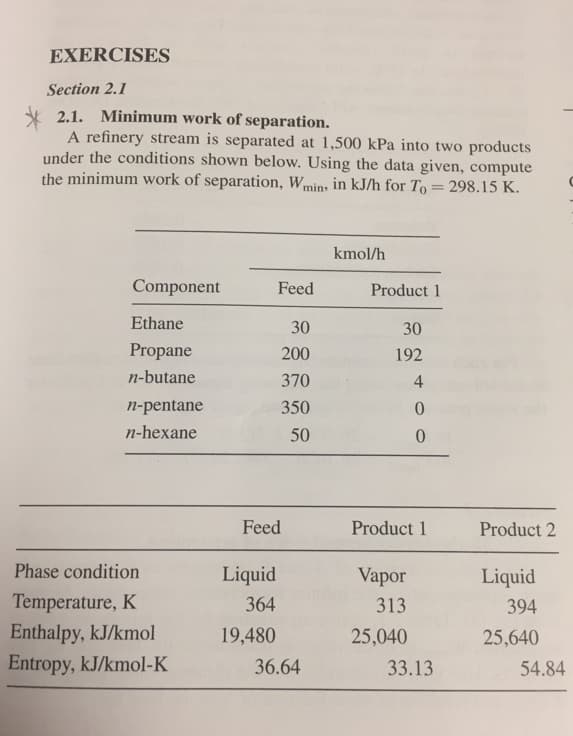EXERCISES Section 2.1 2.1. Minimum work of separation. A refinery stream is separated at 1,500 kPa into two products under the conditions shown below. Using the data given, compute e minimum work of separation, Wmins in kJ/h for To 298.15 K. kmol/h Component Feed Product 1 Ethane Propane n-butane n-pentane n-hexane 30 200 370 350 50 30 192 4 0 Product 1 Vapor 25,040 Feed Product 2 Phase condition Temperature, K Enthalpy, kJ/kmol Entropy, kJ/kmol-K Liquid 364 19,480 Liquid 394 25,640 36.64 33.13 54.84
EXERCISES Section 2.1 2.1. Minimum work of separation. A refinery stream is separated at 1,500 kPa into two products under the conditions shown below. Using the data given, compute e minimum work of separation, Wmins in kJ/h for To 298.15 K. kmol/h Component Feed Product 1 Ethane Propane n-butane n-pentane n-hexane 30 200 370 350 50 30 192 4 0 Product 1 Vapor 25,040 Feed Product 2 Phase condition Temperature, K Enthalpy, kJ/kmol Entropy, kJ/kmol-K Liquid 364 19,480 Liquid 394 25,640 36.64 33.13 54.84
Introduction to Chemical Engineering Thermodynamics
8th Edition
ISBN:9781259696527
Author:J.M. Smith Termodinamica en ingenieria quimica, Hendrick C Van Ness, Michael Abbott, Mark Swihart
Publisher:J.M. Smith Termodinamica en ingenieria quimica, Hendrick C Van Ness, Michael Abbott, Mark Swihart
Chapter1: Introduction
Section: Chapter Questions
Problem 1.1P
Related questions
Question
100%

Transcribed Image Text:EXERCISES
Section 2.1
2.1. Minimum work of separation.
A refinery stream is separated at 1,500 kPa into two products
under the conditions shown below. Using the data given, compute
e minimum work of separation, Wmins in kJ/h for To 298.15 K.
kmol/h
Component Feed Product 1
Ethane
Propane
n-butane
n-pentane
n-hexane
30
200
370
350
50
30
192
4
0
Product 1
Vapor
25,040
Feed
Product 2
Phase condition
Temperature, K
Enthalpy, kJ/kmol
Entropy, kJ/kmol-K
Liquid
364
19,480
Liquid
394
25,640
36.64
33.13
54.84
Expert Solution
This question has been solved!
Explore an expertly crafted, step-by-step solution for a thorough understanding of key concepts.
This is a popular solution!
Trending now
This is a popular solution!
Step by step
Solved in 6 steps with 5 images

Recommended textbooks for you

Introduction to Chemical Engineering Thermodynami…
Chemical Engineering
ISBN:
9781259696527
Author:
J.M. Smith Termodinamica en ingenieria quimica, Hendrick C Van Ness, Michael Abbott, Mark Swihart
Publisher:
McGraw-Hill Education

Elementary Principles of Chemical Processes, Bind…
Chemical Engineering
ISBN:
9781118431221
Author:
Richard M. Felder, Ronald W. Rousseau, Lisa G. Bullard
Publisher:
WILEY

Elements of Chemical Reaction Engineering (5th Ed…
Chemical Engineering
ISBN:
9780133887518
Author:
H. Scott Fogler
Publisher:
Prentice Hall

Introduction to Chemical Engineering Thermodynami…
Chemical Engineering
ISBN:
9781259696527
Author:
J.M. Smith Termodinamica en ingenieria quimica, Hendrick C Van Ness, Michael Abbott, Mark Swihart
Publisher:
McGraw-Hill Education

Elementary Principles of Chemical Processes, Bind…
Chemical Engineering
ISBN:
9781118431221
Author:
Richard M. Felder, Ronald W. Rousseau, Lisa G. Bullard
Publisher:
WILEY

Elements of Chemical Reaction Engineering (5th Ed…
Chemical Engineering
ISBN:
9780133887518
Author:
H. Scott Fogler
Publisher:
Prentice Hall


Industrial Plastics: Theory and Applications
Chemical Engineering
ISBN:
9781285061238
Author:
Lokensgard, Erik
Publisher:
Delmar Cengage Learning

Unit Operations of Chemical Engineering
Chemical Engineering
ISBN:
9780072848236
Author:
Warren McCabe, Julian C. Smith, Peter Harriott
Publisher:
McGraw-Hill Companies, The